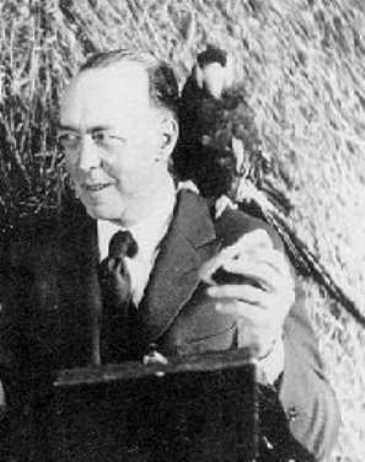Edgar Rice Burroughs' Chicago Years
By Chuck Sudo in News on Sep 1, 2011 9:55PM

Public Domain
By most accounts (including his own) Burroughs had a rebellious streak and attended a number of schools because of lack of discipline, illness or poor performance. His schooling included attending the Harvard School at 18th and Indiana, and Brown Elementary. A major influenza outbreak in 1891 led Burroughs' parents to ship him off to Idaho, where his brothers Harry and George owned a ranch.
Burroughs eventually graduated from Michigan Military Academy in 1895, which he called "a polite reform school." Burroughs long desired to be a commissioned Army officer like his father, but he failed the entrance exam to the United States Military Academy. Undaunted, Burroughs enlisted in the Army, serving in the 7th U.S. Calvary in Fort Grant, AZ.
Burroughs requested the assignment, believing that distinguishing himself in a daunting assignment would fast track him to a commission.
(H)is mission, as he put it, was to "chase the Apaches". "I chased a good many Apaches", he tells us, "But fortunately for me, I never caught up with any of them."
A heart condition ended all hope of Burroughs earning a commission. Ill with dysentery and, with the help of his father's friends, he was discharged in 1897. Burroughs returned to Idaho where started a stationery business in Pocatello, ID, the first in a succession of failed business ventures. He returned home to Chicago shortly after to work at his father's American Battery Company.
On January 30, 1900, Burroughs married his childhood sweetheart, Emma Centennia Hulbert. Burroughs and his wife traveled back west, where he failed in a series of jobs before bringing his wife and now children back to Chicago.
Burroughs tried his hand at many jobs from 1904 to 1908. Time-keeper, light bulb and candy sales, peddling Stoddard's lectures, E. S. Winslow Company accountant and even attempted to enlist in the Chinese army. In 1908 he managed the clerical department at Sears, Roebuck & Company, with some success but, ever restless, he resigned in August 1908.Self-employment ventures put a strain on the young couple. Hocking Emma's jewelry helped, but life became more complicated with the birth of Joan (Jo-Ann) in January 1908. First son Hulbert was born in August 1909. Ed's job as office manager for Physicians Co-Operative Association evaporated when the FDA shut the company down.
While working as a sales manager for a pencil sharpener company, Burroughs stumbled upon his calling.
(Burroughs) was responsible for placing ads in pulp magazines. Reading the stories printed in them, he remarked that he knew "if people were paid for writing rot such as I read in some of those magazines that I could write stories just as rotten."
He eventually sold his first story, "Dejah Thoris, Martian Princess," to All-Story Magazine. He was paid $400 - the equivalent of $8,800 in 2009.
All-Story began serializing the Mars series and later, Burroughs' Tarzan stories, which became a sensation. But he couldn't convince Rand McNally & Co. to publish the Tarzan works. In a letter dated Aug. 20, 1913 to Burroughs at 2008 Park Ave., Chicago:
"Dear Sir,' it read, 'We are returning under separate cover, the All-Story magazine (Oct. 1912) containing your story, Tarzan of the Apes.' "We have given the work careful consideration and, while interesting, we find it does not fit in with our plans for the present year. Thanking you for submitting the story to us, we are Yours very truly, Rand McNally & Co."
Tarzan eventually provided Burroughs the commercial success he had long sought. Against the advice of experts, Burroughs fed the public's demand for the character through comic strips, merchandise and films. Retaining the rights to the character brought Burroughs the wealth to afford a large ranch north of Los Angeles, which he named "Tarzana." The people who moved to areas around the ranch voted to adopt the name "Tarzana" when they incorporated in 1927 or 1928.